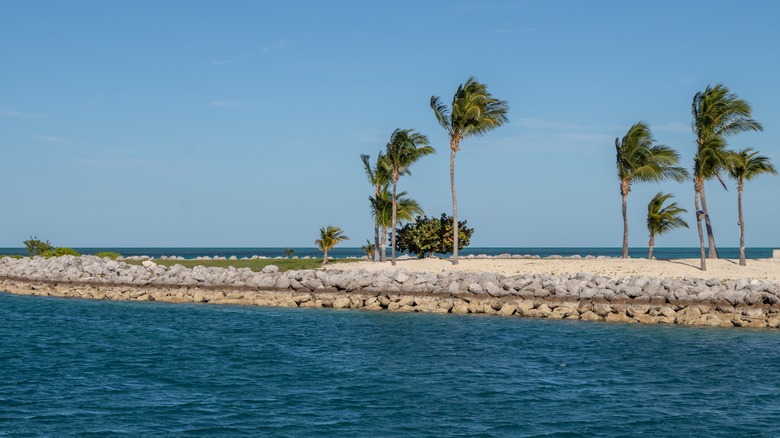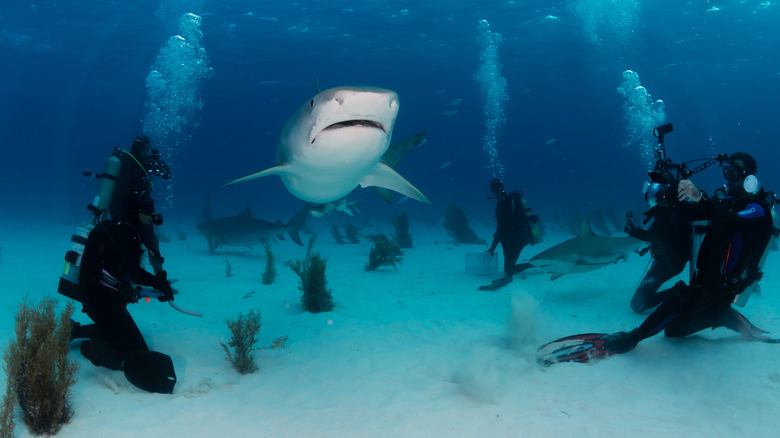The Scary Reason This Caribbean Beach Is So Dangerous
The Caribbean is a dream vacation spot for many. The air is warm, the pristine white sand of the beaches is lovely, and the waters of the Caribbean Sea are clear and refreshing. The Bahamas are particularly renowned for their picturesque coasts. New Providence, home to the capital city of Nassau, is the big draw for tourists, but it isn't the only worthwhile destination among the islands. Further north is Grand Bahama, recommended by Lonely Planet as a calmer spot for a vacation without foregoing infrastructure.
The capital of Grand Bahama is West End. Just 55 miles from Florida, it's a city with a long history — expeditions for the Fountain of Youth, Civil War blockades, and rum running by Caribbean pirates and Prohibition bootleggers all color its past. But things quieted down in West End by the 1940s when the modern tourism infrastructure began putting down roots. Situated on the coast, the city enjoys easy access to beautiful waters and the same sub-tropical climate that pervades all the Bahamas, only adding to its allure as a tempting vacation destination.
But West End has also picked up a reputation for danger. In fact, Oyster named it the most dangerous beach in the Caribbean. The reason? It has some of the most shark-infested waters of any beach on earth, according to The Tribune. There's even an area 20 miles northwest of the city known as Tiger Beach for the large population of tiger sharks that swim in those waters. And over the years there have been numerous injuries and deaths from shark attacks around West End.
Tiger sharks are among the most dangerous
West End is home to everything from hammerheads and bull sharks to blacktips. But it's the tiger sharks, so named for the bands along their backs, that have helped give West End's beaches a dangerous image. Indopacificimages puts them in the "big three" of shark species that pose a threat to humans — along with bull sharks and great whites. Oceana describes tiger sharks as voracious and opportunistic predators, prepared to attack and eat nearly anything they can find, including their own young on occasion. They have no natural predators.
With that said, Tiger Beach is also home to other shark species. In 2008, Markus Groh, a lawyer from Australia who was vacationing in the Bahamas, was killed by a purported lemon shark (per The Tribune). Six years later, an American chiropractor named John Petty was presumably eaten by sharks in the same area, though it's unclear what species they were. His body was never found, but his badly shredded diving gear was.
Shark attacks are rare
Despite these tragedies, it's important to remember that the danger posed by any predatory shark species is minor. Speaking to WESH 2, Dr. Gavin Naylor, who is involved with shark research at the University of Florida, said the relatively high incidence of deadly human-shark encounters in the Bahamas likely has more to do with the large numbers of tourists passing through waters with large numbers of sharks. Most tourists who encounter a shark will swim away without anything bad happening. On the rare occasions when sharks do attack, it's often due to mistaken identity (taking humans for their natural prey in low light conditions) or territoriality.
To put the danger the sharks of West End pose to tourists in perspective, consider these figures from 2014's International Shark Attack File (ISAF) Report, shared by The Tribune: 64 shark attacks occurred that year worldwide, but just two of them were in the Bahamas. One of those was among the five fatal attacks of that year. So companies offering tourists close encounters with sharks in the area isn't as audacious as it might seem.
The sharks are part of West End's tourism
Tiger Beach — which is actually an offshore sand bank originally known as Dry Bank — has become a popular diving spot. Tourists are brought out to the area, sent underwater, and can swim alongside tiger sharks, which are lured in by tempting bait stashed in boxes scattered along the sand. It's been observed that many of the sharks who come to Tiger Beach are heavily pregnant, and that has led some to suspect that the area acts as a "nursery" for the sharks (though juveniles are self-sufficient hunters at birth and tend to live apart from adults to avoid cannibalism, per Oceana).
Diving trips to Tiger Beach come with extensive briefings on proper behavior, and the sharks have ample prey and the bait set out by tours to keep them fed and occupied. But Dr. Gavin Naylor told WESH 2 that while the risk of a shark attack in West End or anywhere else may be low, no one should mistake sharks as safe animals to be around. He recommends that anyone swimming with sharks avoid low-light areas and dispersal sites for bait.



